|
|
|
Sort Order |
|
|
|
Items / Page
|
|
|
|
|
|
|
| Srl | Item |
| 1 |
ID:
189466
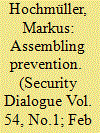

|
|
|
|
|
| Summary/Abstract |
This article examines the technopolitics of prevention in postwar Guatemala. In the 2010s, experts and policymakers shifted security governance in Central America’s most populous country towards anticipation. Against the background of rising gang violence, they implemented a set of sociopolitical and techno-material measures – based on the latest crime-control technologies, new policing strategies and urban design methods – in Guatemala’s most violent municipalities. The stated goals were to reconstruct state sovereignty and to improve public security by strengthening community resilience and inducing positive behavioural change in ‘at-risk’ citizens. Zooming in on the case of Villa Nueva, the article examines the emergence and effects of Guatemala’s ‘prevention assemblage’. It demonstrates that this technopolitical project has failed, as prevention turned into a new layer of control that shifted responsibility to local communities, further securitized urban spaces and populations, and reproduced exclusionary and repressive security governance.
|
|
|
|
|
|
|
|
|
|
|
|
|
|
|
|
| 2 |
ID:
131614
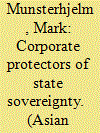

|
|
|
|
|
| Publication |
2014.
|
| Summary/Abstract |
This paper compares two related corporations' accounts of enacting sovereignty with Taiwan Aborigines. First, Mitsubishi corporate webpage histories constitute mythic origin narratives about how their patriotic founder, Yataro Iwasaki, helped the Japanese government transport munitions and troops to Taiwan in 1874 and the government rewarded him with 30 ships, starting their close relationship. These narratives about this state-centred assemblage omit why Japan sent the military expedition, which ostensibly was a punitive expedition against Paiwan Aborigines for the 1871 massacre of 54 Ryukyu Islanders, but was actually part of the new Meiji state's annexation of the Ryukyu Islands. Second, it analyses the Shung Ye Museum of Formosan Aborigines which was founded in 1994 by the wealthy chair of the Shung Ye Group, a Taiwan-based Mitsubishi-affiliated conglomerate. The museum is a private assemblage organized around hero narratives in which the chair demonstrates his patriotism by rescuing Taiwan Aborigines and their cultures. The museum contributes to the Taiwan-centred identity project which challenges One-China sovereignty claims over Taiwan.
|
|
|
|
|
|
|
|
|
|
|
|
|
|
|
|
| 3 |
ID:
163078
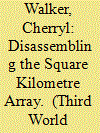

|
|
|
|
|
| Summary/Abstract |
The article poses questions about astronomy and its local, national and global developmental impacts, drawing on ongoing research around the internationally networked Square Kilometre Array (SKA) radio telescope in South Africa. The relationship between progress in global science and technology and societal change has traditionally been framed through western-centric notions of progress imbued with universalism; the field of astronomy exemplifies this approach, with its assumptions of an inherently positive correlation between its science and loosely defined notions of ‘development’. We problematise this assumption through an analysis of the multiple notions of development at different scales of analysis in the SKA. We argue that large astronomy projects such as the SKA are best understood as dense assemblages of science, infrastructure, human agency and politics, in which historically rooted local concerns are marginalised in the name of the national or global public interest.
|
|
|
|
|
|
|
|
|
|
|
|
|
|
|
|
| 4 |
ID:
164406
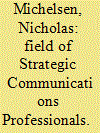

|
|
|
|
|
| Summary/Abstract |
Communication has long been accepted as integral to the conduct of international affairs. The role that discourses, ideas, norms, and narratives play at the systemic level of world politics has been examined extensively. Scholarly interest has now turned to how international actors use political communication tools to create and counter threats, such as propaganda, hybrid warfare, fake news, and election tampering, and it is often taken for granted that states are inferior to their challengers in these domains. To address this, ‘Strategic Communications’ has emerged as a mode of thought and practice promising to enhance state communication; encompassing long-established activities including public diplomacy, public relations, nation branding, and information operations. In this developing field, private sector professionals are increasingly being called on to support and advise governments. Particular attention has been paid to the ‘Big Data’ private companies may have access to, but there has been little IR research examining the experts seeking changes in how strategic communications is practised. Informed by elite interviews with communication professionals across the public-private space, this article sets out a research agenda to fill this gap, enhancing understanding of the expert relationships that shape international strategic communications.
|
|
|
|
|
|
|
|
|
|
|
|
|
|
|
|
| 5 |
ID:
157922
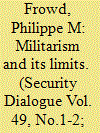

|
|
|
|
|
| Summary/Abstract |
This article assesses the concepts of militarism and militarization in relation to contemporary security interventions in the Sahel, a region increasingly understood through the prisms of violence, cross-border illicit flows, and limited statehood. This region is subject to security interventions that include French military action, EU-funded projects to prevent drug trafficking, and both bilateral and multilateral efforts against irregular migration. To many observers, it is experiencing an ongoing militarization. We argue that while the inextricable concepts of militarism and militarization go some way towards explaining interventions’ occasional use of military violence, they are limited in their grasp of the non-martial and symbolic violence in security practices. We instead propose a focus on assemblages of (in)security to show the heterogeneous mix of global and local actors, and often contradictory rationalities and practices that shape the logics of symbolic and martial violence in the region. Throughout, the article draws on the authors’ fieldwork in Mauritania, Senegal, and Niger, and includes two case studies on efforts against the Sahel’s ‘crime–terror nexus’ and to control irregular migration through the region. The article’s contribution is to better situate debates about militarism and militarization in relation to (in)security and to provide a more granular understanding of the Sahel’s security politics.
|
|
|
|
|
|
|
|
|
|
|
|
|
|
|
|
| 6 |
ID:
164433
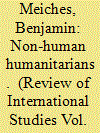

|
|
|
|
|
| Summary/Abstract |
The study of humanitarian intervention typically focuses on the human victims and saviours in armed conflict and natural disasters. Moreover, explanations of the virtues of humanitarian norms and ethics emphasise the importance of the university of suffering and the empathic nature of humanitarian efforts. In contrast, this article explores the neglected world of ‘non-human humanitarians’. Specifically, the article outlines three cases of non-human actors that expand and complicate international humanitarian practices: dogs, drones, and diagrams. Drawing on new materialist and posthuman literatures, the article argues that non-humans possess distinct capacities that vastly expand and transform humanitarian efforts in ranging from relief, to medicine, to conflict resolution. Highlighting non-human humanitarians thus offers a new perspective on the resources available for redressing mass violence and conflict, but also complicates existing definitions of humanitarian norms. To the contrary, the article demonstrates that non-humans often maximise humanitarian services to a degree greater than their human counterparts, but have also introduced changes into humanitarian practices that have problematic unintended consequences. Non-human humanitarians reveals previously discounted participants in international politics and the key roles they play in various international interventions.
|
|
|
|
|
|
|
|
|
|
|
|
|
|
|
|
| 7 |
ID:
151745
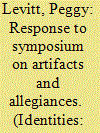

|
|
|
|
|
| Summary/Abstract |
The author responds to the contributions to this symposium, highlighting her ideas about diversity management regimes, the urban cultural armature, global museum assemblages, the cosmopolitan-nationalism continuum, and new methods for studying the global and for engaging in constructive critique.
|
|
|
|
|
|
|
|
|
|
|
|
|
|
|
|
| 8 |
ID:
154528
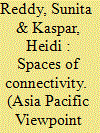

|
|
|
|
|
| Summary/Abstract |
Existing research on the formation of Asian medical travel destinations has highlighted a variety of activities that attract and accommodate patients from abroad. This paper contributes to the literature by drawing insights from an Indian case study, a major transnational health-care hub in Asia that has gained little scholarly attention thus far. Using connectivity as an analytical lens, we understand medical travel destinations as a contingent product of relating, connecting and assembling. We study how connectivity is embodied and how it unfolds in care encounters at corporate hospitals in the capital of New Delhi and surrounding urban areas. The following entities are the most effectual in the networks that constitute medical travel destinations in the National Capital Region: (i) circulating narrations of personal experiences; (ii) language interpreters; and (iii) commission fees. We further elaborate on how these connectors work to link foreign patients with Indian hospitals and how they affect itineraries as well as patients and other involved actors. Finally, we suggest that the approach deployed provides a suitable framework for future research aimed at gaining a better understanding of the wider impacts of medical travel by following these connections and examining their workings at places both close and distant.
|
|
|
|
|
|
|
|
|
|
|
|
|
|
|
|
| 9 |
ID:
179373
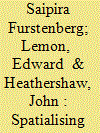

|
|
|
|
|
| Summary/Abstract |
This article theorises the repressive security practices of authoritarian states in the context of transnationalism and globalisation. While emerging research on transnational repression has identified a range of extraterritorial and exceptional security practices adopted by authoritarian states, it has not fully studied the implications of such practices on space and statecraft. Using data from the Central Asia Political Exile Database project (CAPE) and interviews conducted with exiled Tajik opposition groups based in Russia and Europe, we theorise the spatial connections between the territorial and extraterritorial security practices using the concept of assemblages. We further outline how these practices escalate in a three-stage model, in which exiles go on notice, are detained and then rendered or assassinated. Such an approach sheds light on the inherent links between the normalisation of security practices and the creation of transnational space with distinct forms of geographical state power that is embedded in non-national spaces and is manifested through spatially organised actors, networks, and technologies within assemblages.
|
|
|
|
|
|
|
|
|
|
|
|
|
|
|
|
|
|
|
|
|